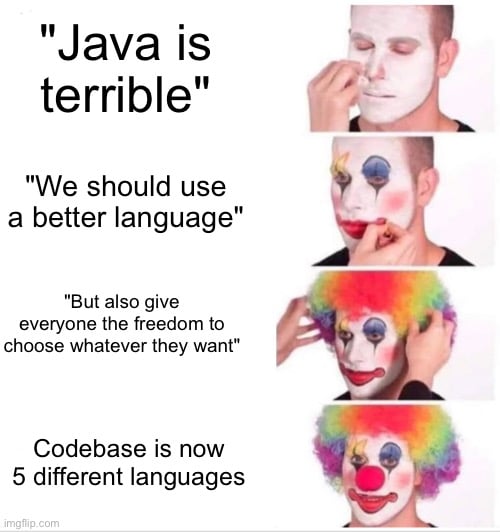this post was submitted on 05 Apr 2024
524 points (94.4% liked)
Programmer Humor
22635 readers
1656 users here now
Welcome to Programmer Humor!
This is a place where you can post jokes, memes, humor, etc. related to programming!
For sharing awful code theres also Programming Horror.
Rules
- Keep content in english
- No advertisements
- Posts must be related to programming or programmer topics
founded 2 years ago
MODERATORS
you are viewing a single comment's thread
view the rest of the comments
view the rest of the comments

Skip step 3, and just switch to Kotlin. Worked wonders for Android
Yes indeed, and it feels really good.
Is Kotlin bad?
Kotlin is Java with all the suck taken out.
It's a modern, ergonomic language that runs on the JVM and removes as much GD boilerplate as it can.
It's fantastic.
https://kotlinlang.org/docs/maven.html That's not true, you can use Maven if you want!
Cargo is really simple, which is great, but also limiting. Maven is much more complex, but for good reason - there's use cases, especially around multi-artifact projects and version sharing, where cargo would require either some glue or you run into some interesting edge cases. Usually, Rust isn't used for the kinds of big, wacky projects with a million dependencies that companies write in Java/Kotlin, so those kinds of use cases are considered more unusual.
Gradle, in my opinion, makes itself complex because it's all code, is very brittle, and several of its features just don't work right and require workarounds. When it works, it builds fast and it works well, but getting it to work, and how often you have to get it to work again...not worth it.
Sorry, one more question. What does ergonomic mean in regards to programming languages?
Lots of little quality of life things. For instance, in Kotlin types can be marked nullable or not. When you are passing a potential null into a non-nullable argument, the compiler raises an error.
But if you had already checked earlier in scope whether or not the value was null, the compiler remembers that the value is guaranteed not to be null and won't blow up.
Same for other typechecks. Once you have asserted that a value is a given type, you don't need to cast it everywhere else. The compiler will remember.
Ooh, thank you
Kotlin is the tits